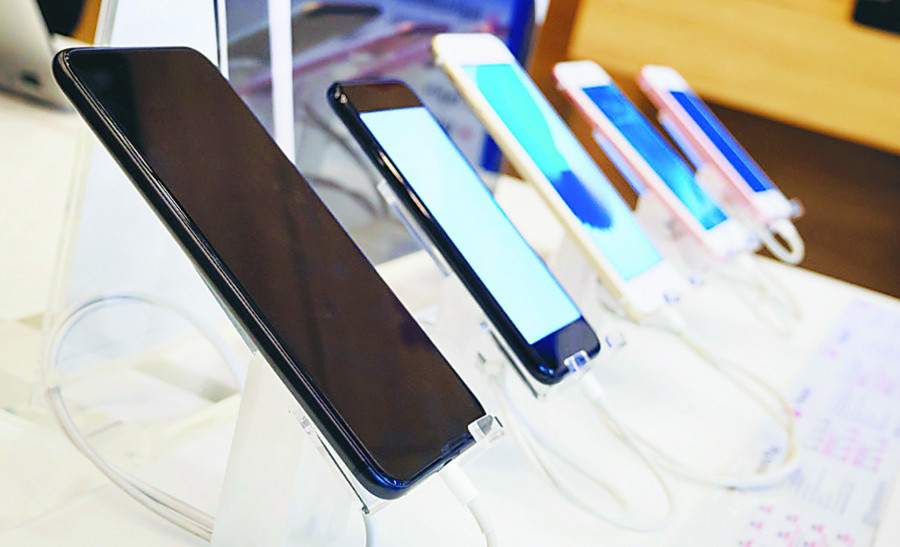Money
Mobile Device Management System launch put off due to lockdown
The Rs650 million system will bring smartphones under the registration net, making it easier for authorities to monitor them, officials say.
Krishana Prasain
The Nepal Telecommunications Authority said its plan to roll out the Mobile Device Management System in mid-July had to be put off due to the ever-lengthening lockdown.
The regulator had wanted to implement the system that will secure cell phones and make illegal sets unserviceable, by the beginning of the fiscal year, as announced in the budget statement.
The Mobile Device Management System will consist of white, grey and blacklists of IMEI codes and provide interfaces to importers, customs and law enforcement agencies, mobile operators, the general public and the Nepal Telecommunications Authority. It is also expected to control criminal activities.
Mobile phone dealers have long been complaining about falling sales because of a rampant grey market. The Mobile Device Management System will bring smartphones under the registration net, making it easier for authorities to monitor them, according to Nepal Telecommunications Authority.
Purushottam Khanal, chairman of the telecom authority, said that a shipment of equipment required to set up a data centre had not arrived. “With the pandemic raging, international experts are also unlikely to come to Nepal to install the system and train people.”
According to him, except for the data centre, 70 percent of the work to set up the Mobile Device Management System has been completed.
The system will be synced to a database called Equipment Identity Register that contains records of legal and illegal mobile devices in the country. The device management system is also expected to identify cloned, low-cost copy versions of branded phones with fake registration numbers.
The telecom regulatory authority moved to develop the system four years ago after the Mobile Device Management System Bylaws 2018 were issued.
As per the law, all mobile devices which enter Nepal through business or personal channels must be registered with the system or they will be black listed. Once black listed, the mobile devices will be deemed non-compliant, and network operators will be asked to deny service to such phones.
The system being built by the telecom regulator involves setting up a data centre where the personal records of mobile phone owners registered on the network of Nepal's three telecom operators will be stored.
The mobile connectivity of telecom operators like Nepal Telecom, Ncell and Smart Telecom will need to be connected to the system that will be operated from a new building built in Chabahil.
The hardware and software installation has been done at the Government Integrated Data Centre. It has been constructed as a sophisticated data centre at the national level to be used by all entities of the government.
In June 2019, the telecom regulator had selected Malaysian firm Nuemera as the service provider to implement the system.
Nuemera got into controversy in 2017 following revelations that a similar phone blocking system it developed under an outsourcing model for the Malaysian Communications and Multimedia Commission was found to be the source of a data leak that affected 46.2 million subscribers in Malaysia.
Khanal said that there was an issue with Nuemera, but that the Malaysian regulator had already clarified the matter. “As per our terms and conditions, the data will securely remain in the country and it cannot be leaked, and this rule will be strictly applied,” Khanal told the Post.
According to Khanal, the government will create a way out for mobile devices that entered Nepal through illegal channels and are currently being used.
“But once the system comes into implementation, illegally imported mobile devices, especially those that entered the country without customs registration, will not come into operation,” he said.
The telecom regulator said the system was being built at a cost of Rs650 million.
According to the Department of Customs, the country imported mobile phones worth Rs32.09 billion in the first 10 months of the current fiscal year. In the same period of the last fiscal year, the mobile phone import bill totalled just Rs14.68 billion.
Domestic mobile phone dealers said the higher import figure was the result of the disappearance of the grey market because all transport routes, including international flights, were shut down following the lockdown.
Government revenue collection rose sharply after the grey market was wiped out, insiders said.
Grey market mobile phones enter the country, especially from India, in hand baggage, and no customs duty is paid on them. Many returning travellers also bring phones for their friends and relatives, according to domestic mobile dealers.
The telecom authority said the grey market would be totally shut down right after the system comes into operation, Chances of theft will be minimised, and criminal activities that are conducted through the use of mobile phones will be reduced, it said.




 20.12°C Kathmandu
20.12°C Kathmandu














